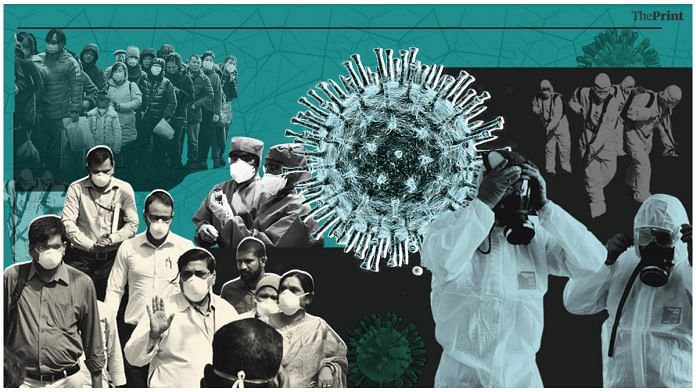The total number of confirmed coronavirus cases have climbed to six in India. Prime Minister Narendra Modi has asked people to not “panic” and said “different ministries and states were working together”. Health Minister Harsh Vardhan said that the government is “prepared in advance”. India, in the past, has had a mixed record of tackling outbreaks like SARS, swine flu and Nipah virus.
ThePrint asks: Will India’s experience with previous outbreaks help it tackle coronavirus better?
Like in the case of swine flu and Nipah virus, India needs to tackle coronavirus on a war footing
 Keshav Desiraju
Keshav Desiraju
Former health secretary
India’s comparative success in dealing with swine flu when it broke out in 2009 was because all public hospitals were fully organised to handle the suspected cases and keep those affected isolated. It was done on a war footing.
More recently, Kerala’s success in tackling the Nipah virus also showed that systems have to work with total concentration and attention to every single suspected case. Similar systems have to be put in place at the present time with particular attention to tracking persons at the point of entry into India — whether airports or ports.
This is what was done at the time of swine flu. Anyone who showed any symptoms, his/her samples were taken and sent to Delhi. It was tackled quite well, and this should happen now also.
Even in the case of a widespread disease, the point is to make an early identification of the persons who are suspected. The authorities can’t get away from the fact that they have to reach every person who may be affected. Even if there is one person who has fallen outside the government’s tracking mechanism, there is a potential danger. This is the nature of an epidemic. That is where India will need strong public health systems at work.
If well-prepared, India can tackle COVID-19. But like with previous cases, it is inertia that delays response
 Amir Ullah Khan
Amir Ullah Khan
Senior Fellow at RGICS
India’s success in battling HIV/AIDS, polio and Nipah is well-documented and shows that if well prepared, our health system can definitely tackle coronavirus too. However, like with all previous cases, it is the inertia that delays the response.
There is almost always a diffidence on display in accepting that there is a problem, that it is potentially devastating and that the state cannot tackle epidemics on its own. We see the same trouble starting now, with the coronavirus literally on our airport steps.
India’s repeated attempts at eliminating kala-azar (black fever) and tuberculosis indicate the systemic problems that the country faces. Millions of infected patients stay undiagnosed or misdiagnosed in poor quality laboratories spread unevenly across India. Drug shortages, poor management of recovery, absence of rehabilitation facilities – all add to the problem and leave India’s health system extremely vulnerable to pernicious mortality rates, even from vector-borne diseases such as malaria and dengue.
However, the recent battle that Kerala won against Nipah gives hope. Of course, Kerala is not Uttar Pradesh, and the success there cannot be easily generalised.
However, when the epidemic broke out in May 2018 and claimed 17 lives, a multidisciplinary team was set up that took up all tasks simultaneously. The frontline workers were given huge protection, surveillance was mounted at an unprecedented level, civil society was drafted to disseminate information, panic was not allowed to set in, drug stocks were carefully monitored, and the disease just stopped from spreading. We need this preparedness to be replicated across India now.
 T Jacob John
T Jacob John
Former professor of Clinical Virology, CMC Vellore
When SARS (Severe Acute Respiratory Syndrome) appeared on the global scene in 2003, every country had to screen people coming from affected countries. If people with fever were found to be coming from any of the suspected places, they were immediately put on quarantine.
India had three confirmed cases of SARS in 2003, but we managed extremely well. Since the virus was easy to detect, we didn’t face much problem. The Nipah virus in Kerala in 2018 was handled superbly for two reasons: one, the physician who saw the patient had previously worked in a country where Nipah was recognised. That was a stroke of great luck.
Second, there was a lab that could test for Nipah virus. So, the diagnosis was quickly done and the health ministry swung into action and did everything right.
During the H1N1 pandemic, India didn’t do well and made several mistakes. For example, there was overcrowding in testing labs. Now the question is: Is coronavirus more like SARS or swine flu (Influenza A)? If it is like influenza, India will not be able to handle coronavirus.
India can handle a health crisis only when it lasts for a short period of time and the interventions are very limited and focussed. If it becomes a widespread problem, we don’t have a track record of doing well. So, I am quite apprehensive about India’s ability to manage coronavirus.
There will be differences in the way states manage coronavirus. Not all have Kerala-like health system
 Rajeev Sadanandan
Rajeev Sadanandan
Former additional chief secretary, dept of health, Kerala
Other states in India do not have the kind of health system that Kerala had while dealing with the Nipah virus. So, the question of how well India can handle the coronavirus depends on how prepared our healthcare system is. I anticipate differences in the way states will be able to handle this.
All the affected people coming from Wuhan in China were quarantined and screened, but now there are nine epicentres. One of them is Iran, which is passing on the virus to other countries in the Middle East, with which India clearly has a link. The numbers are going to be really huge. It is not a single epicentre that we can focus on, which makes the surveillance job much more difficult. India will have to screen every traveller who could be a potential carrier of the virus.
One of the important lessons we learnt during the Nipah outbreak was contact tracing, which the Telangana government is also doing. It means that you have to find out all those people the affected person has been in contact with during the incubation period and keep a track on them. The lessons on the importance of contact tracing and isolation can be applied here.
We also learnt the importance of managing hospital-acquired infections during the Nipah outbreak. Although, with coronavirus, the chances of community-based spread are more. So, general community awareness on washing hands frequently and limiting social interactions should be spread, which is a difficult task.
Also read: Is Indian economy equipped to deal with the global disruption caused by coronavirus?
By Unnati Sharma, journalist at ThePrint




lot has been said on this virus but i am yet not aware of how it was originated cure might lie in fact that how it started .. The theory i heard was 1. bad habits of eating animals like Bat lead to this..some say its not that but accidental leak of Bio weapon of China can we try & de-clutter the origin what it can be
The medical and paramedical teams have the competence and experience to deal with this disease, provided the number of affected people does not explode. However, the physical facilities, including medication, could prove to be a constraint, especially in the less prosperous states. With an outbreak of this nature occurring roughly once in a decade, India needs to devote more financial resources to healthcare.